Impact of Culture, Teamwork & Motivation on Performance at Asda
VerifiedAdded on 2023/06/17
|16
|4950
|361
Report
AI Summary
This report provides an analysis of organisational behaviour within Asda, focusing on the influence of culture, power, and politics on individual and team behaviour. It explores content and process theories of motivation, including Maslow's and Herzberg's theories, and examines the characteristics of effective teams. The report also applies concepts and philosophies of organisational behaviour to the Asda context, evaluating both positive and negative impacts. The analysis considers role culture, expert power, and positive politics as key factors in enhancing employee motivation and team performance, while also acknowledging potential drawbacks such as conflicts arising from power dynamics or inequitable treatment. Ultimately, the report aims to understand how Asda can leverage organisational behaviour principles to improve productivity and achieve its business goals.
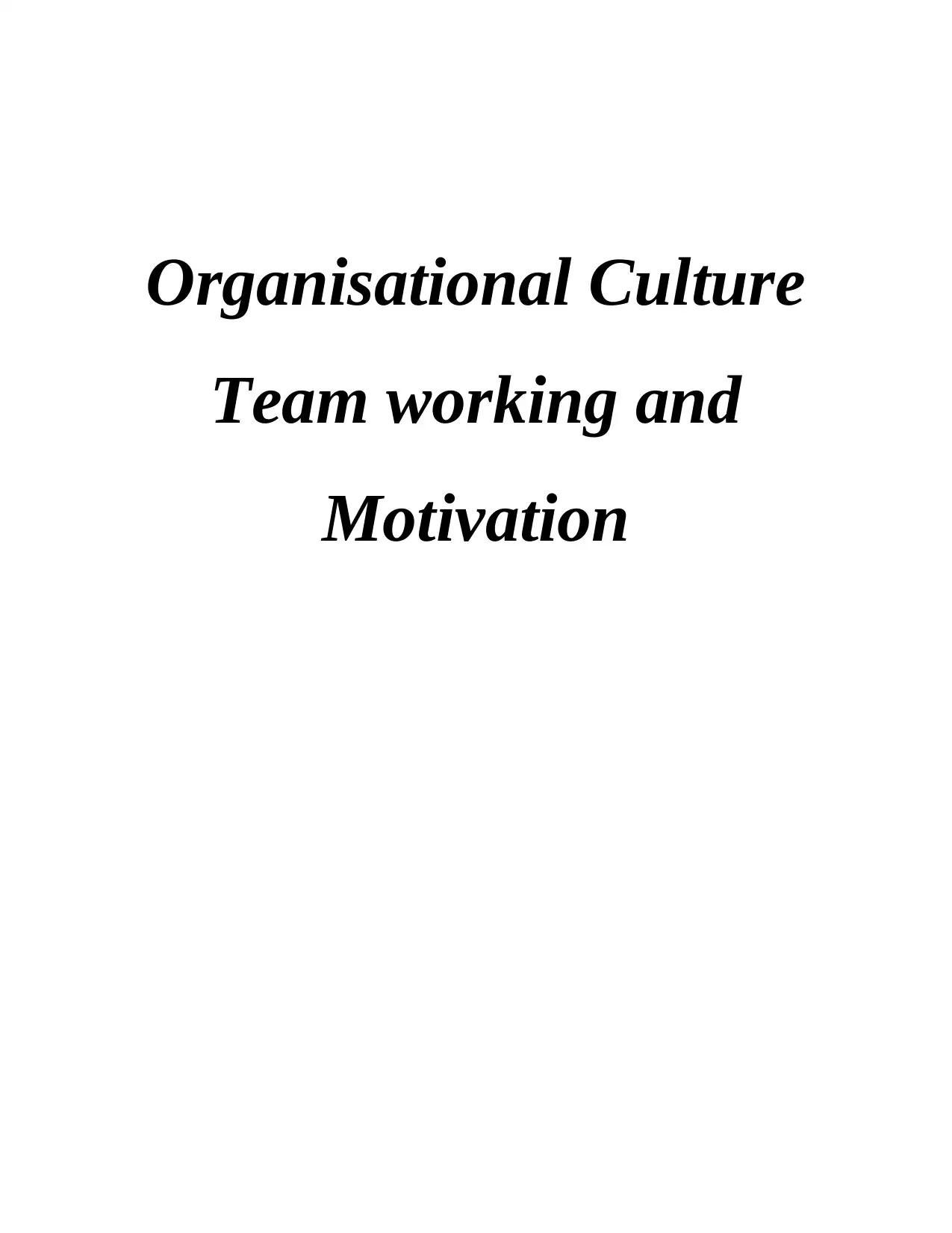
Organisational Culture
Team working and
Motivation
Team working and
Motivation
Paraphrase This Document
Need a fresh take? Get an instant paraphrase of this document with our AI Paraphraser
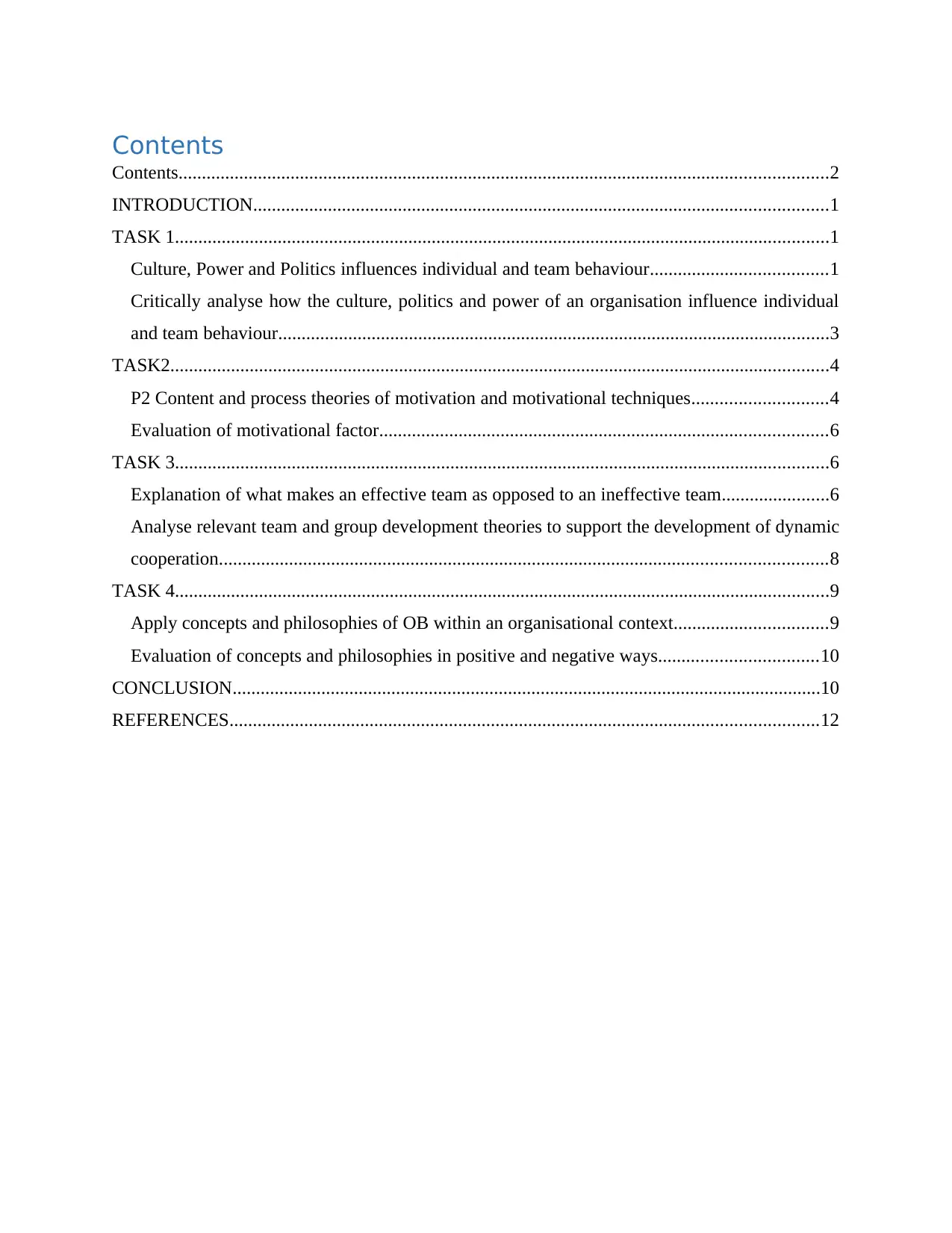
Contents
Contents...........................................................................................................................................2
INTRODUCTION...........................................................................................................................1
TASK 1............................................................................................................................................1
Culture, Power and Politics influences individual and team behaviour......................................1
Critically analyse how the culture, politics and power of an organisation influence individual
and team behaviour......................................................................................................................3
TASK2.............................................................................................................................................4
P2 Content and process theories of motivation and motivational techniques.............................4
Evaluation of motivational factor................................................................................................6
TASK 3............................................................................................................................................6
Explanation of what makes an effective team as opposed to an ineffective team.......................6
Analyse relevant team and group development theories to support the development of dynamic
cooperation..................................................................................................................................8
TASK 4............................................................................................................................................9
Apply concepts and philosophies of OB within an organisational context.................................9
Evaluation of concepts and philosophies in positive and negative ways..................................10
CONCLUSION..............................................................................................................................10
REFERENCES..............................................................................................................................12
Contents...........................................................................................................................................2
INTRODUCTION...........................................................................................................................1
TASK 1............................................................................................................................................1
Culture, Power and Politics influences individual and team behaviour......................................1
Critically analyse how the culture, politics and power of an organisation influence individual
and team behaviour......................................................................................................................3
TASK2.............................................................................................................................................4
P2 Content and process theories of motivation and motivational techniques.............................4
Evaluation of motivational factor................................................................................................6
TASK 3............................................................................................................................................6
Explanation of what makes an effective team as opposed to an ineffective team.......................6
Analyse relevant team and group development theories to support the development of dynamic
cooperation..................................................................................................................................8
TASK 4............................................................................................................................................9
Apply concepts and philosophies of OB within an organisational context.................................9
Evaluation of concepts and philosophies in positive and negative ways..................................10
CONCLUSION..............................................................................................................................10
REFERENCES..............................................................................................................................12

⊘ This is a preview!⊘
Do you want full access?
Subscribe today to unlock all pages.

Trusted by 1+ million students worldwide
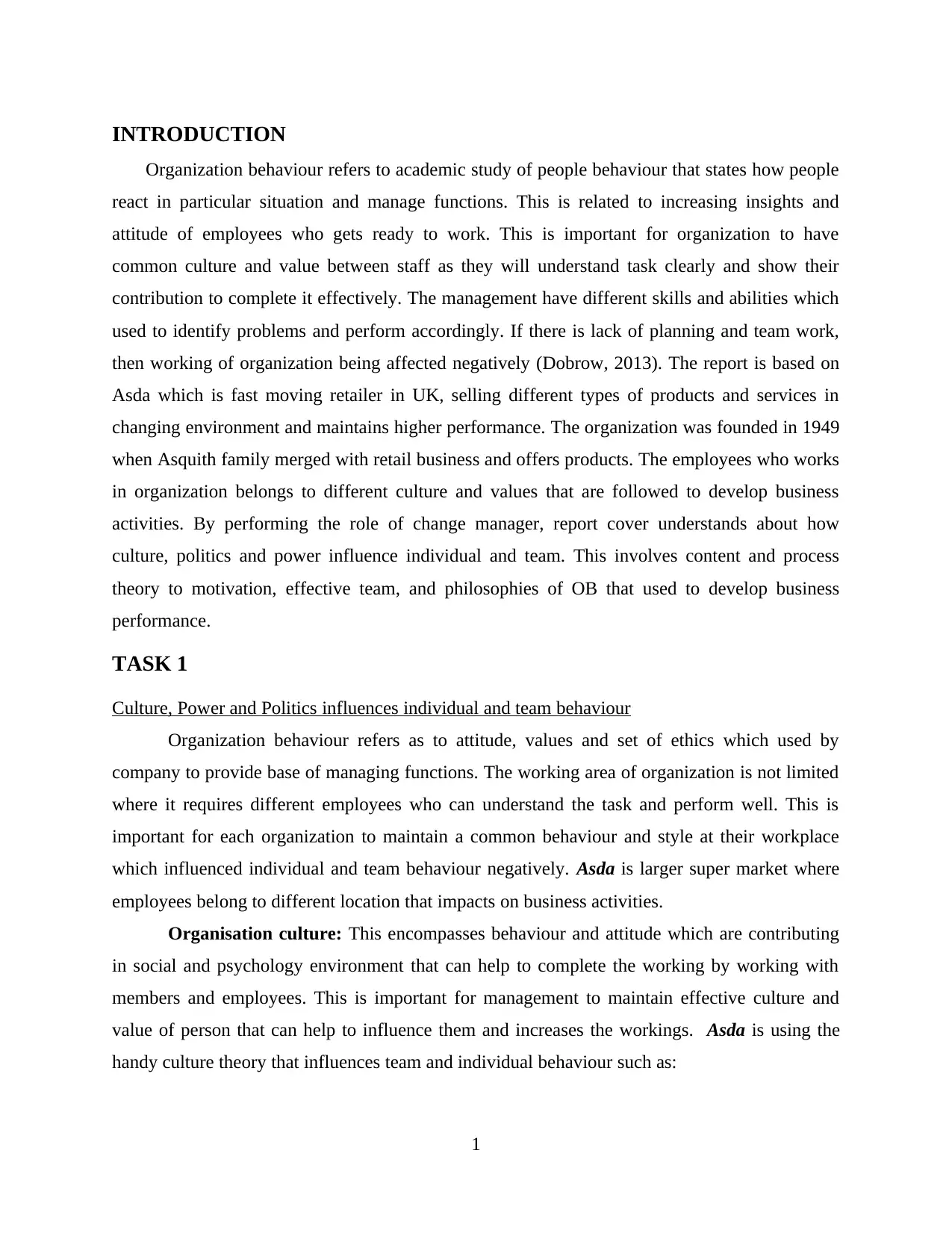
INTRODUCTION
Organization behaviour refers to academic study of people behaviour that states how people
react in particular situation and manage functions. This is related to increasing insights and
attitude of employees who gets ready to work. This is important for organization to have
common culture and value between staff as they will understand task clearly and show their
contribution to complete it effectively. The management have different skills and abilities which
used to identify problems and perform accordingly. If there is lack of planning and team work,
then working of organization being affected negatively (Dobrow, 2013). The report is based on
Asda which is fast moving retailer in UK, selling different types of products and services in
changing environment and maintains higher performance. The organization was founded in 1949
when Asquith family merged with retail business and offers products. The employees who works
in organization belongs to different culture and values that are followed to develop business
activities. By performing the role of change manager, report cover understands about how
culture, politics and power influence individual and team. This involves content and process
theory to motivation, effective team, and philosophies of OB that used to develop business
performance.
TASK 1
Culture, Power and Politics influences individual and team behaviour
Organization behaviour refers as to attitude, values and set of ethics which used by
company to provide base of managing functions. The working area of organization is not limited
where it requires different employees who can understand the task and perform well. This is
important for each organization to maintain a common behaviour and style at their workplace
which influenced individual and team behaviour negatively. Asda is larger super market where
employees belong to different location that impacts on business activities.
Organisation culture: This encompasses behaviour and attitude which are contributing
in social and psychology environment that can help to complete the working by working with
members and employees. This is important for management to maintain effective culture and
value of person that can help to influence them and increases the workings. Asda is using the
handy culture theory that influences team and individual behaviour such as:
1
Organization behaviour refers to academic study of people behaviour that states how people
react in particular situation and manage functions. This is related to increasing insights and
attitude of employees who gets ready to work. This is important for organization to have
common culture and value between staff as they will understand task clearly and show their
contribution to complete it effectively. The management have different skills and abilities which
used to identify problems and perform accordingly. If there is lack of planning and team work,
then working of organization being affected negatively (Dobrow, 2013). The report is based on
Asda which is fast moving retailer in UK, selling different types of products and services in
changing environment and maintains higher performance. The organization was founded in 1949
when Asquith family merged with retail business and offers products. The employees who works
in organization belongs to different culture and values that are followed to develop business
activities. By performing the role of change manager, report cover understands about how
culture, politics and power influence individual and team. This involves content and process
theory to motivation, effective team, and philosophies of OB that used to develop business
performance.
TASK 1
Culture, Power and Politics influences individual and team behaviour
Organization behaviour refers as to attitude, values and set of ethics which used by
company to provide base of managing functions. The working area of organization is not limited
where it requires different employees who can understand the task and perform well. This is
important for each organization to maintain a common behaviour and style at their workplace
which influenced individual and team behaviour negatively. Asda is larger super market where
employees belong to different location that impacts on business activities.
Organisation culture: This encompasses behaviour and attitude which are contributing
in social and psychology environment that can help to complete the working by working with
members and employees. This is important for management to maintain effective culture and
value of person that can help to influence them and increases the workings. Asda is using the
handy culture theory that influences team and individual behaviour such as:
1
Paraphrase This Document
Need a fresh take? Get an instant paraphrase of this document with our AI Paraphraser
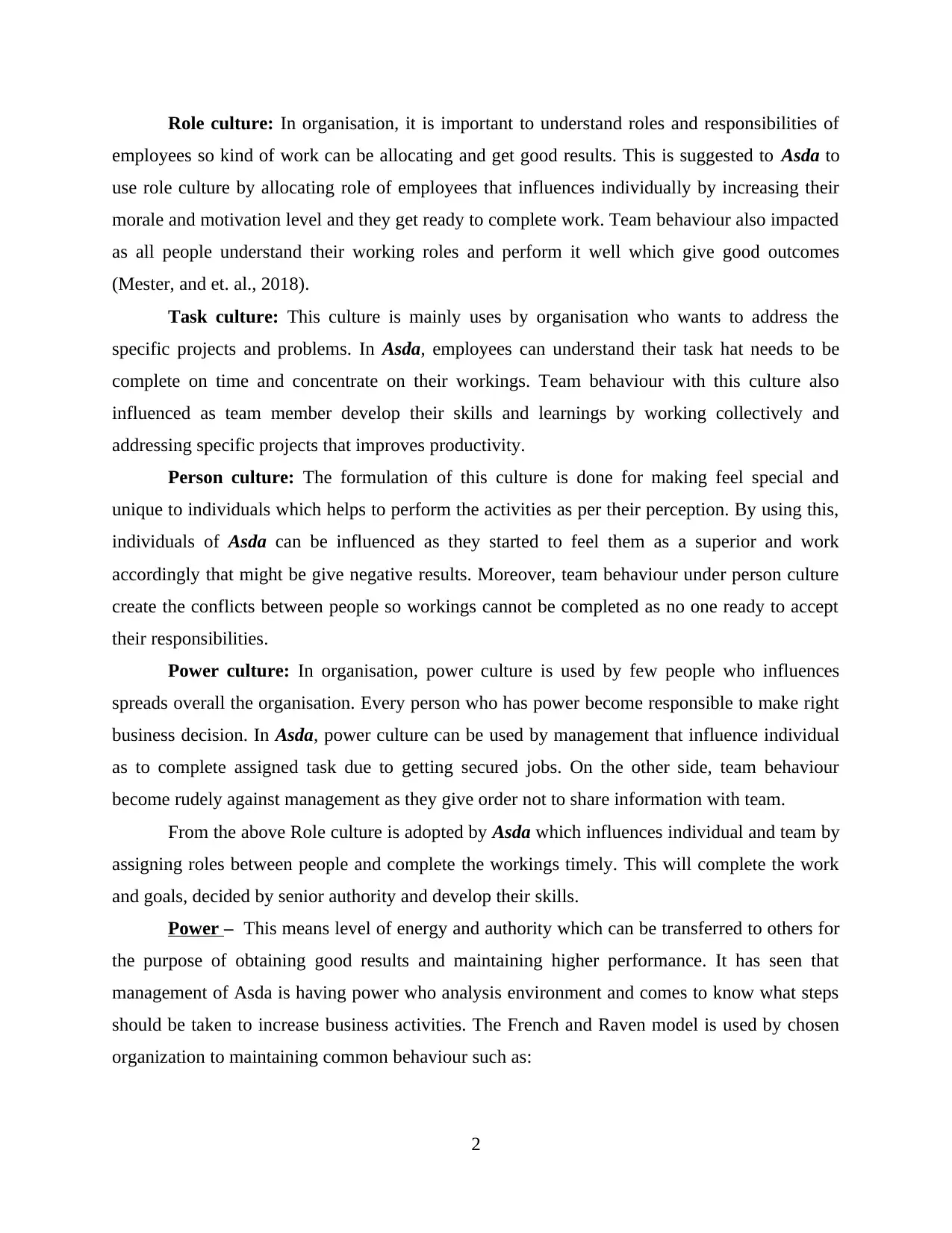
Role culture: In organisation, it is important to understand roles and responsibilities of
employees so kind of work can be allocating and get good results. This is suggested to Asda to
use role culture by allocating role of employees that influences individually by increasing their
morale and motivation level and they get ready to complete work. Team behaviour also impacted
as all people understand their working roles and perform it well which give good outcomes
(Mester, and et. al., 2018).
Task culture: This culture is mainly uses by organisation who wants to address the
specific projects and problems. In Asda, employees can understand their task hat needs to be
complete on time and concentrate on their workings. Team behaviour with this culture also
influenced as team member develop their skills and learnings by working collectively and
addressing specific projects that improves productivity.
Person culture: The formulation of this culture is done for making feel special and
unique to individuals which helps to perform the activities as per their perception. By using this,
individuals of Asda can be influenced as they started to feel them as a superior and work
accordingly that might be give negative results. Moreover, team behaviour under person culture
create the conflicts between people so workings cannot be completed as no one ready to accept
their responsibilities.
Power culture: In organisation, power culture is used by few people who influences
spreads overall the organisation. Every person who has power become responsible to make right
business decision. In Asda, power culture can be used by management that influence individual
as to complete assigned task due to getting secured jobs. On the other side, team behaviour
become rudely against management as they give order not to share information with team.
From the above Role culture is adopted by Asda which influences individual and team by
assigning roles between people and complete the workings timely. This will complete the work
and goals, decided by senior authority and develop their skills.
Power – This means level of energy and authority which can be transferred to others for
the purpose of obtaining good results and maintaining higher performance. It has seen that
management of Asda is having power who analysis environment and comes to know what steps
should be taken to increase business activities. The French and Raven model is used by chosen
organization to maintaining common behaviour such as:
2
employees so kind of work can be allocating and get good results. This is suggested to Asda to
use role culture by allocating role of employees that influences individually by increasing their
morale and motivation level and they get ready to complete work. Team behaviour also impacted
as all people understand their working roles and perform it well which give good outcomes
(Mester, and et. al., 2018).
Task culture: This culture is mainly uses by organisation who wants to address the
specific projects and problems. In Asda, employees can understand their task hat needs to be
complete on time and concentrate on their workings. Team behaviour with this culture also
influenced as team member develop their skills and learnings by working collectively and
addressing specific projects that improves productivity.
Person culture: The formulation of this culture is done for making feel special and
unique to individuals which helps to perform the activities as per their perception. By using this,
individuals of Asda can be influenced as they started to feel them as a superior and work
accordingly that might be give negative results. Moreover, team behaviour under person culture
create the conflicts between people so workings cannot be completed as no one ready to accept
their responsibilities.
Power culture: In organisation, power culture is used by few people who influences
spreads overall the organisation. Every person who has power become responsible to make right
business decision. In Asda, power culture can be used by management that influence individual
as to complete assigned task due to getting secured jobs. On the other side, team behaviour
become rudely against management as they give order not to share information with team.
From the above Role culture is adopted by Asda which influences individual and team by
assigning roles between people and complete the workings timely. This will complete the work
and goals, decided by senior authority and develop their skills.
Power – This means level of energy and authority which can be transferred to others for
the purpose of obtaining good results and maintaining higher performance. It has seen that
management of Asda is having power who analysis environment and comes to know what steps
should be taken to increase business activities. The French and Raven model is used by chosen
organization to maintaining common behaviour such as:
2
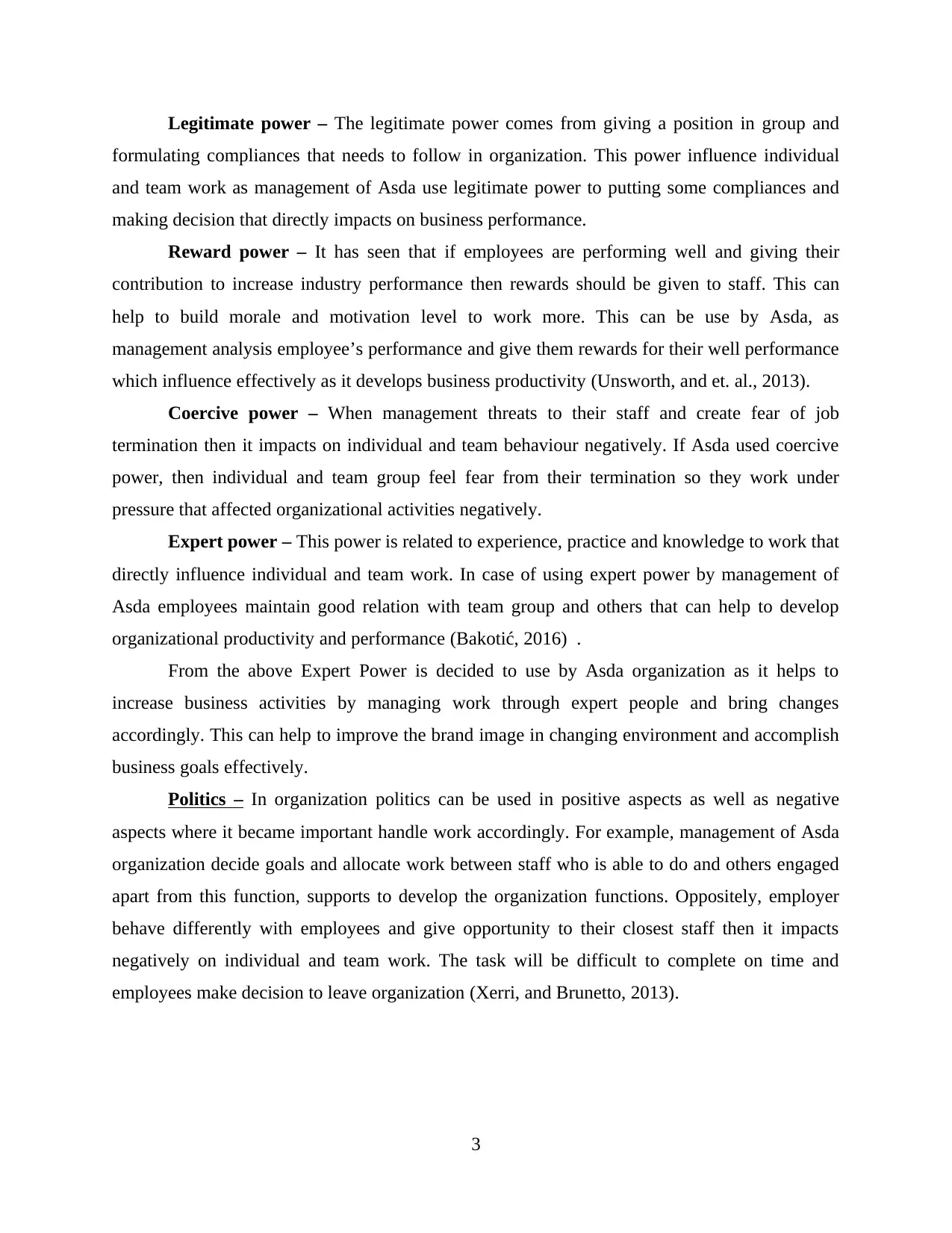
Legitimate power – The legitimate power comes from giving a position in group and
formulating compliances that needs to follow in organization. This power influence individual
and team work as management of Asda use legitimate power to putting some compliances and
making decision that directly impacts on business performance.
Reward power – It has seen that if employees are performing well and giving their
contribution to increase industry performance then rewards should be given to staff. This can
help to build morale and motivation level to work more. This can be use by Asda, as
management analysis employee’s performance and give them rewards for their well performance
which influence effectively as it develops business productivity (Unsworth, and et. al., 2013).
Coercive power – When management threats to their staff and create fear of job
termination then it impacts on individual and team behaviour negatively. If Asda used coercive
power, then individual and team group feel fear from their termination so they work under
pressure that affected organizational activities negatively.
Expert power – This power is related to experience, practice and knowledge to work that
directly influence individual and team work. In case of using expert power by management of
Asda employees maintain good relation with team group and others that can help to develop
organizational productivity and performance (Bakotić, 2016) .
From the above Expert Power is decided to use by Asda organization as it helps to
increase business activities by managing work through expert people and bring changes
accordingly. This can help to improve the brand image in changing environment and accomplish
business goals effectively.
Politics – In organization politics can be used in positive aspects as well as negative
aspects where it became important handle work accordingly. For example, management of Asda
organization decide goals and allocate work between staff who is able to do and others engaged
apart from this function, supports to develop the organization functions. Oppositely, employer
behave differently with employees and give opportunity to their closest staff then it impacts
negatively on individual and team work. The task will be difficult to complete on time and
employees make decision to leave organization (Xerri, and Brunetto, 2013).
3
formulating compliances that needs to follow in organization. This power influence individual
and team work as management of Asda use legitimate power to putting some compliances and
making decision that directly impacts on business performance.
Reward power – It has seen that if employees are performing well and giving their
contribution to increase industry performance then rewards should be given to staff. This can
help to build morale and motivation level to work more. This can be use by Asda, as
management analysis employee’s performance and give them rewards for their well performance
which influence effectively as it develops business productivity (Unsworth, and et. al., 2013).
Coercive power – When management threats to their staff and create fear of job
termination then it impacts on individual and team behaviour negatively. If Asda used coercive
power, then individual and team group feel fear from their termination so they work under
pressure that affected organizational activities negatively.
Expert power – This power is related to experience, practice and knowledge to work that
directly influence individual and team work. In case of using expert power by management of
Asda employees maintain good relation with team group and others that can help to develop
organizational productivity and performance (Bakotić, 2016) .
From the above Expert Power is decided to use by Asda organization as it helps to
increase business activities by managing work through expert people and bring changes
accordingly. This can help to improve the brand image in changing environment and accomplish
business goals effectively.
Politics – In organization politics can be used in positive aspects as well as negative
aspects where it became important handle work accordingly. For example, management of Asda
organization decide goals and allocate work between staff who is able to do and others engaged
apart from this function, supports to develop the organization functions. Oppositely, employer
behave differently with employees and give opportunity to their closest staff then it impacts
negatively on individual and team work. The task will be difficult to complete on time and
employees make decision to leave organization (Xerri, and Brunetto, 2013).
3
⊘ This is a preview!⊘
Do you want full access?
Subscribe today to unlock all pages.

Trusted by 1+ million students worldwide
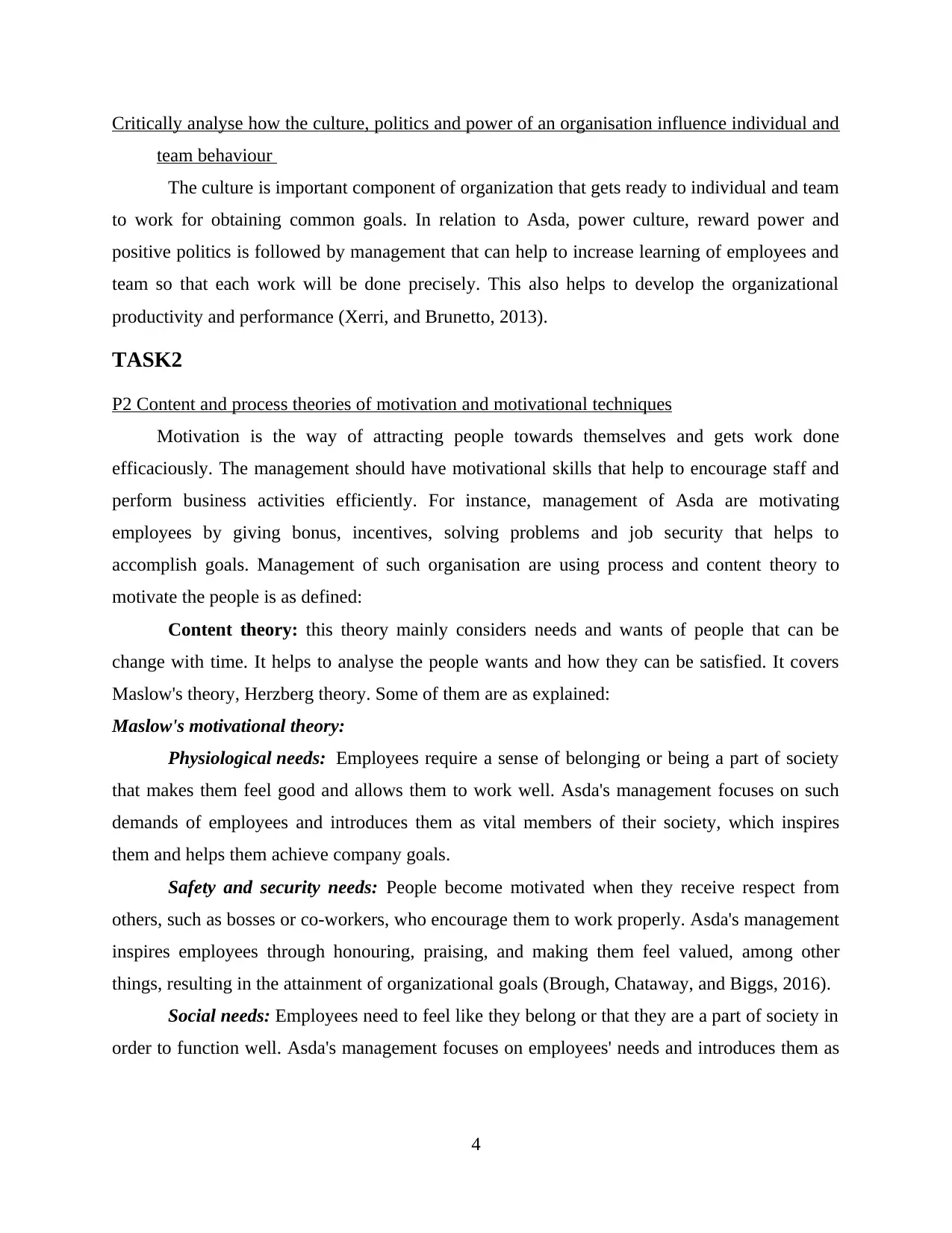
Critically analyse how the culture, politics and power of an organisation influence individual and
team behaviour
The culture is important component of organization that gets ready to individual and team
to work for obtaining common goals. In relation to Asda, power culture, reward power and
positive politics is followed by management that can help to increase learning of employees and
team so that each work will be done precisely. This also helps to develop the organizational
productivity and performance (Xerri, and Brunetto, 2013).
TASK2
P2 Content and process theories of motivation and motivational techniques
Motivation is the way of attracting people towards themselves and gets work done
efficaciously. The management should have motivational skills that help to encourage staff and
perform business activities efficiently. For instance, management of Asda are motivating
employees by giving bonus, incentives, solving problems and job security that helps to
accomplish goals. Management of such organisation are using process and content theory to
motivate the people is as defined:
Content theory: this theory mainly considers needs and wants of people that can be
change with time. It helps to analyse the people wants and how they can be satisfied. It covers
Maslow's theory, Herzberg theory. Some of them are as explained:
Maslow's motivational theory:
Physiological needs: Employees require a sense of belonging or being a part of society
that makes them feel good and allows them to work well. Asda's management focuses on such
demands of employees and introduces them as vital members of their society, which inspires
them and helps them achieve company goals.
Safety and security needs: People become motivated when they receive respect from
others, such as bosses or co-workers, who encourage them to work properly. Asda's management
inspires employees through honouring, praising, and making them feel valued, among other
things, resulting in the attainment of organizational goals (Brough, Chataway, and Biggs, 2016).
Social needs: Employees need to feel like they belong or that they are a part of society in
order to function well. Asda's management focuses on employees' needs and introduces them as
4
team behaviour
The culture is important component of organization that gets ready to individual and team
to work for obtaining common goals. In relation to Asda, power culture, reward power and
positive politics is followed by management that can help to increase learning of employees and
team so that each work will be done precisely. This also helps to develop the organizational
productivity and performance (Xerri, and Brunetto, 2013).
TASK2
P2 Content and process theories of motivation and motivational techniques
Motivation is the way of attracting people towards themselves and gets work done
efficaciously. The management should have motivational skills that help to encourage staff and
perform business activities efficiently. For instance, management of Asda are motivating
employees by giving bonus, incentives, solving problems and job security that helps to
accomplish goals. Management of such organisation are using process and content theory to
motivate the people is as defined:
Content theory: this theory mainly considers needs and wants of people that can be
change with time. It helps to analyse the people wants and how they can be satisfied. It covers
Maslow's theory, Herzberg theory. Some of them are as explained:
Maslow's motivational theory:
Physiological needs: Employees require a sense of belonging or being a part of society
that makes them feel good and allows them to work well. Asda's management focuses on such
demands of employees and introduces them as vital members of their society, which inspires
them and helps them achieve company goals.
Safety and security needs: People become motivated when they receive respect from
others, such as bosses or co-workers, who encourage them to work properly. Asda's management
inspires employees through honouring, praising, and making them feel valued, among other
things, resulting in the attainment of organizational goals (Brough, Chataway, and Biggs, 2016).
Social needs: Employees need to feel like they belong or that they are a part of society in
order to function well. Asda's management focuses on employees' needs and introduces them as
4
Paraphrase This Document
Need a fresh take? Get an instant paraphrase of this document with our AI Paraphraser
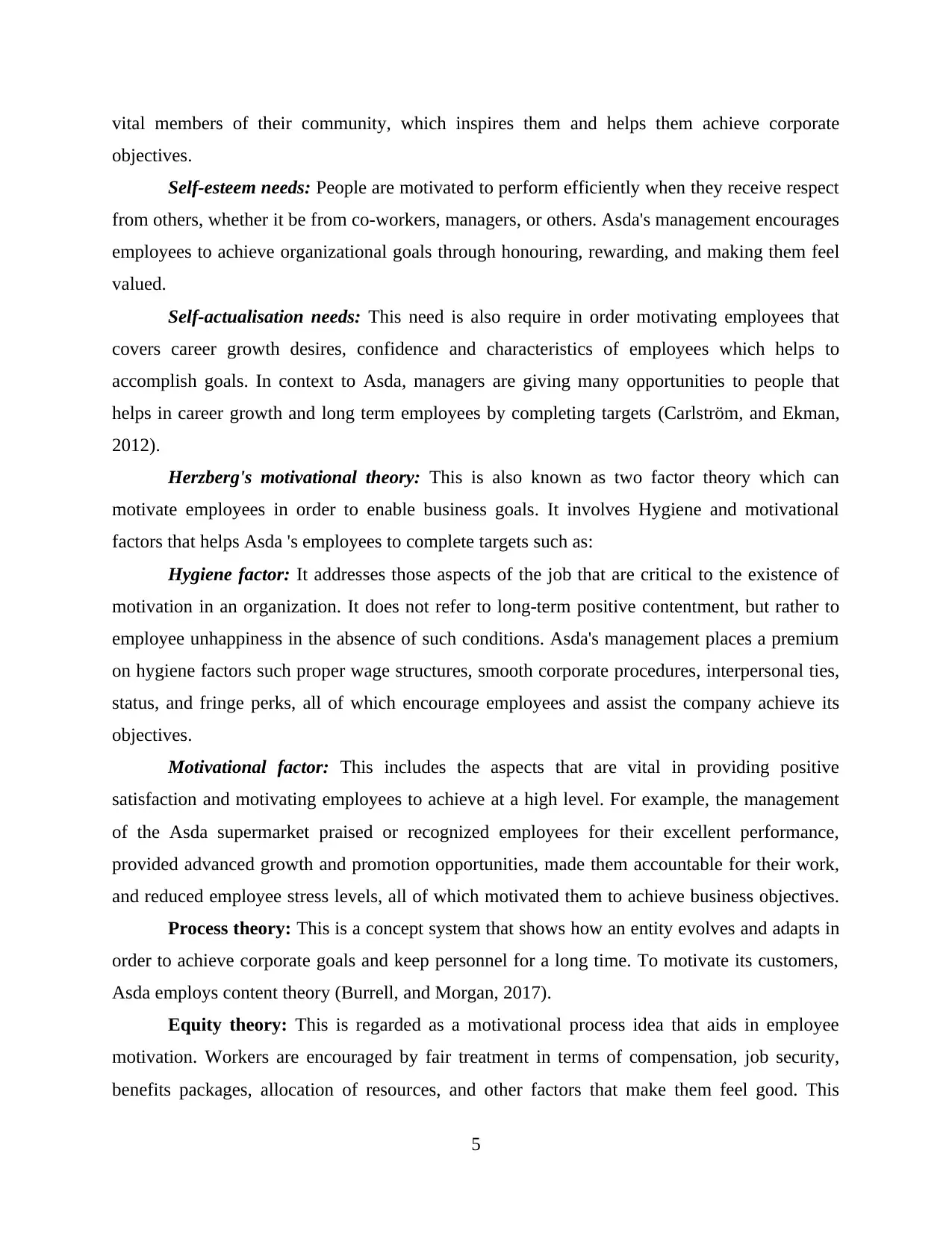
vital members of their community, which inspires them and helps them achieve corporate
objectives.
Self-esteem needs: People are motivated to perform efficiently when they receive respect
from others, whether it be from co-workers, managers, or others. Asda's management encourages
employees to achieve organizational goals through honouring, rewarding, and making them feel
valued.
Self-actualisation needs: This need is also require in order motivating employees that
covers career growth desires, confidence and characteristics of employees which helps to
accomplish goals. In context to Asda, managers are giving many opportunities to people that
helps in career growth and long term employees by completing targets (Carlström, and Ekman,
2012).
Herzberg's motivational theory: This is also known as two factor theory which can
motivate employees in order to enable business goals. It involves Hygiene and motivational
factors that helps Asda 's employees to complete targets such as:
Hygiene factor: It addresses those aspects of the job that are critical to the existence of
motivation in an organization. It does not refer to long-term positive contentment, but rather to
employee unhappiness in the absence of such conditions. Asda's management places a premium
on hygiene factors such proper wage structures, smooth corporate procedures, interpersonal ties,
status, and fringe perks, all of which encourage employees and assist the company achieve its
objectives.
Motivational factor: This includes the aspects that are vital in providing positive
satisfaction and motivating employees to achieve at a high level. For example, the management
of the Asda supermarket praised or recognized employees for their excellent performance,
provided advanced growth and promotion opportunities, made them accountable for their work,
and reduced employee stress levels, all of which motivated them to achieve business objectives.
Process theory: This is a concept system that shows how an entity evolves and adapts in
order to achieve corporate goals and keep personnel for a long time. To motivate its customers,
Asda employs content theory (Burrell, and Morgan, 2017).
Equity theory: This is regarded as a motivational process idea that aids in employee
motivation. Workers are encouraged by fair treatment in terms of compensation, job security,
benefits packages, allocation of resources, and other factors that make them feel good. This
5
objectives.
Self-esteem needs: People are motivated to perform efficiently when they receive respect
from others, whether it be from co-workers, managers, or others. Asda's management encourages
employees to achieve organizational goals through honouring, rewarding, and making them feel
valued.
Self-actualisation needs: This need is also require in order motivating employees that
covers career growth desires, confidence and characteristics of employees which helps to
accomplish goals. In context to Asda, managers are giving many opportunities to people that
helps in career growth and long term employees by completing targets (Carlström, and Ekman,
2012).
Herzberg's motivational theory: This is also known as two factor theory which can
motivate employees in order to enable business goals. It involves Hygiene and motivational
factors that helps Asda 's employees to complete targets such as:
Hygiene factor: It addresses those aspects of the job that are critical to the existence of
motivation in an organization. It does not refer to long-term positive contentment, but rather to
employee unhappiness in the absence of such conditions. Asda's management places a premium
on hygiene factors such proper wage structures, smooth corporate procedures, interpersonal ties,
status, and fringe perks, all of which encourage employees and assist the company achieve its
objectives.
Motivational factor: This includes the aspects that are vital in providing positive
satisfaction and motivating employees to achieve at a high level. For example, the management
of the Asda supermarket praised or recognized employees for their excellent performance,
provided advanced growth and promotion opportunities, made them accountable for their work,
and reduced employee stress levels, all of which motivated them to achieve business objectives.
Process theory: This is a concept system that shows how an entity evolves and adapts in
order to achieve corporate goals and keep personnel for a long time. To motivate its customers,
Asda employs content theory (Burrell, and Morgan, 2017).
Equity theory: This is regarded as a motivational process idea that aids in employee
motivation. Workers are encouraged by fair treatment in terms of compensation, job security,
benefits packages, allocation of resources, and other factors that make them feel good. This
5
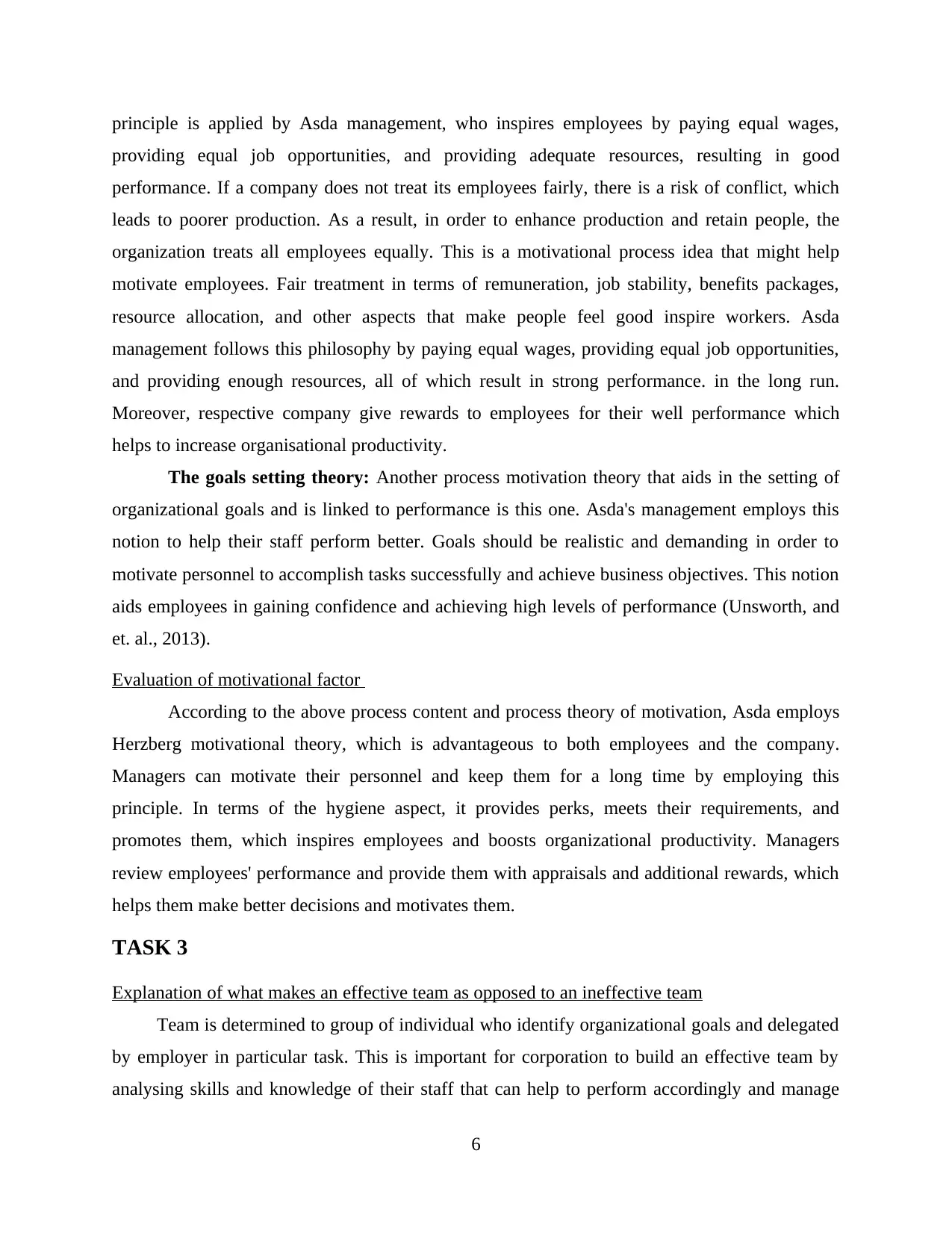
principle is applied by Asda management, who inspires employees by paying equal wages,
providing equal job opportunities, and providing adequate resources, resulting in good
performance. If a company does not treat its employees fairly, there is a risk of conflict, which
leads to poorer production. As a result, in order to enhance production and retain people, the
organization treats all employees equally. This is a motivational process idea that might help
motivate employees. Fair treatment in terms of remuneration, job stability, benefits packages,
resource allocation, and other aspects that make people feel good inspire workers. Asda
management follows this philosophy by paying equal wages, providing equal job opportunities,
and providing enough resources, all of which result in strong performance. in the long run.
Moreover, respective company give rewards to employees for their well performance which
helps to increase organisational productivity.
The goals setting theory: Another process motivation theory that aids in the setting of
organizational goals and is linked to performance is this one. Asda's management employs this
notion to help their staff perform better. Goals should be realistic and demanding in order to
motivate personnel to accomplish tasks successfully and achieve business objectives. This notion
aids employees in gaining confidence and achieving high levels of performance (Unsworth, and
et. al., 2013).
Evaluation of motivational factor
According to the above process content and process theory of motivation, Asda employs
Herzberg motivational theory, which is advantageous to both employees and the company.
Managers can motivate their personnel and keep them for a long time by employing this
principle. In terms of the hygiene aspect, it provides perks, meets their requirements, and
promotes them, which inspires employees and boosts organizational productivity. Managers
review employees' performance and provide them with appraisals and additional rewards, which
helps them make better decisions and motivates them.
TASK 3
Explanation of what makes an effective team as opposed to an ineffective team
Team is determined to group of individual who identify organizational goals and delegated
by employer in particular task. This is important for corporation to build an effective team by
analysing skills and knowledge of their staff that can help to perform accordingly and manage
6
providing equal job opportunities, and providing adequate resources, resulting in good
performance. If a company does not treat its employees fairly, there is a risk of conflict, which
leads to poorer production. As a result, in order to enhance production and retain people, the
organization treats all employees equally. This is a motivational process idea that might help
motivate employees. Fair treatment in terms of remuneration, job stability, benefits packages,
resource allocation, and other aspects that make people feel good inspire workers. Asda
management follows this philosophy by paying equal wages, providing equal job opportunities,
and providing enough resources, all of which result in strong performance. in the long run.
Moreover, respective company give rewards to employees for their well performance which
helps to increase organisational productivity.
The goals setting theory: Another process motivation theory that aids in the setting of
organizational goals and is linked to performance is this one. Asda's management employs this
notion to help their staff perform better. Goals should be realistic and demanding in order to
motivate personnel to accomplish tasks successfully and achieve business objectives. This notion
aids employees in gaining confidence and achieving high levels of performance (Unsworth, and
et. al., 2013).
Evaluation of motivational factor
According to the above process content and process theory of motivation, Asda employs
Herzberg motivational theory, which is advantageous to both employees and the company.
Managers can motivate their personnel and keep them for a long time by employing this
principle. In terms of the hygiene aspect, it provides perks, meets their requirements, and
promotes them, which inspires employees and boosts organizational productivity. Managers
review employees' performance and provide them with appraisals and additional rewards, which
helps them make better decisions and motivates them.
TASK 3
Explanation of what makes an effective team as opposed to an ineffective team
Team is determined to group of individual who identify organizational goals and delegated
by employer in particular task. This is important for corporation to build an effective team by
analysing skills and knowledge of their staff that can help to perform accordingly and manage
6
⊘ This is a preview!⊘
Do you want full access?
Subscribe today to unlock all pages.

Trusted by 1+ million students worldwide
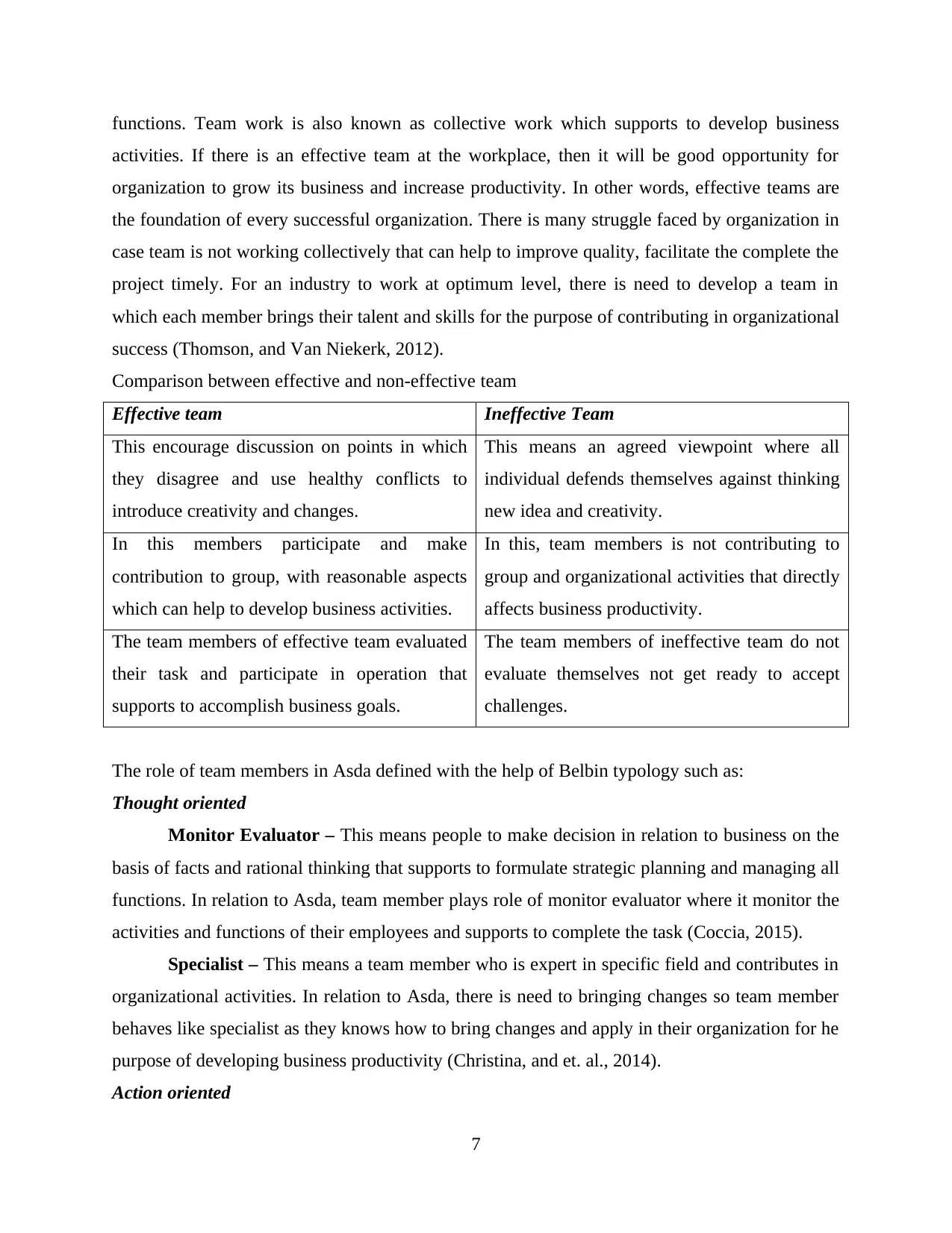
functions. Team work is also known as collective work which supports to develop business
activities. If there is an effective team at the workplace, then it will be good opportunity for
organization to grow its business and increase productivity. In other words, effective teams are
the foundation of every successful organization. There is many struggle faced by organization in
case team is not working collectively that can help to improve quality, facilitate the complete the
project timely. For an industry to work at optimum level, there is need to develop a team in
which each member brings their talent and skills for the purpose of contributing in organizational
success (Thomson, and Van Niekerk, 2012).
Comparison between effective and non-effective team
Effective team Ineffective Team
This encourage discussion on points in which
they disagree and use healthy conflicts to
introduce creativity and changes.
This means an agreed viewpoint where all
individual defends themselves against thinking
new idea and creativity.
In this members participate and make
contribution to group, with reasonable aspects
which can help to develop business activities.
In this, team members is not contributing to
group and organizational activities that directly
affects business productivity.
The team members of effective team evaluated
their task and participate in operation that
supports to accomplish business goals.
The team members of ineffective team do not
evaluate themselves not get ready to accept
challenges.
The role of team members in Asda defined with the help of Belbin typology such as:
Thought oriented
Monitor Evaluator – This means people to make decision in relation to business on the
basis of facts and rational thinking that supports to formulate strategic planning and managing all
functions. In relation to Asda, team member plays role of monitor evaluator where it monitor the
activities and functions of their employees and supports to complete the task (Coccia, 2015).
Specialist – This means a team member who is expert in specific field and contributes in
organizational activities. In relation to Asda, there is need to bringing changes so team member
behaves like specialist as they knows how to bring changes and apply in their organization for he
purpose of developing business productivity (Christina, and et. al., 2014).
Action oriented
7
activities. If there is an effective team at the workplace, then it will be good opportunity for
organization to grow its business and increase productivity. In other words, effective teams are
the foundation of every successful organization. There is many struggle faced by organization in
case team is not working collectively that can help to improve quality, facilitate the complete the
project timely. For an industry to work at optimum level, there is need to develop a team in
which each member brings their talent and skills for the purpose of contributing in organizational
success (Thomson, and Van Niekerk, 2012).
Comparison between effective and non-effective team
Effective team Ineffective Team
This encourage discussion on points in which
they disagree and use healthy conflicts to
introduce creativity and changes.
This means an agreed viewpoint where all
individual defends themselves against thinking
new idea and creativity.
In this members participate and make
contribution to group, with reasonable aspects
which can help to develop business activities.
In this, team members is not contributing to
group and organizational activities that directly
affects business productivity.
The team members of effective team evaluated
their task and participate in operation that
supports to accomplish business goals.
The team members of ineffective team do not
evaluate themselves not get ready to accept
challenges.
The role of team members in Asda defined with the help of Belbin typology such as:
Thought oriented
Monitor Evaluator – This means people to make decision in relation to business on the
basis of facts and rational thinking that supports to formulate strategic planning and managing all
functions. In relation to Asda, team member plays role of monitor evaluator where it monitor the
activities and functions of their employees and supports to complete the task (Coccia, 2015).
Specialist – This means a team member who is expert in specific field and contributes in
organizational activities. In relation to Asda, there is need to bringing changes so team member
behaves like specialist as they knows how to bring changes and apply in their organization for he
purpose of developing business productivity (Christina, and et. al., 2014).
Action oriented
7
Paraphrase This Document
Need a fresh take? Get an instant paraphrase of this document with our AI Paraphraser
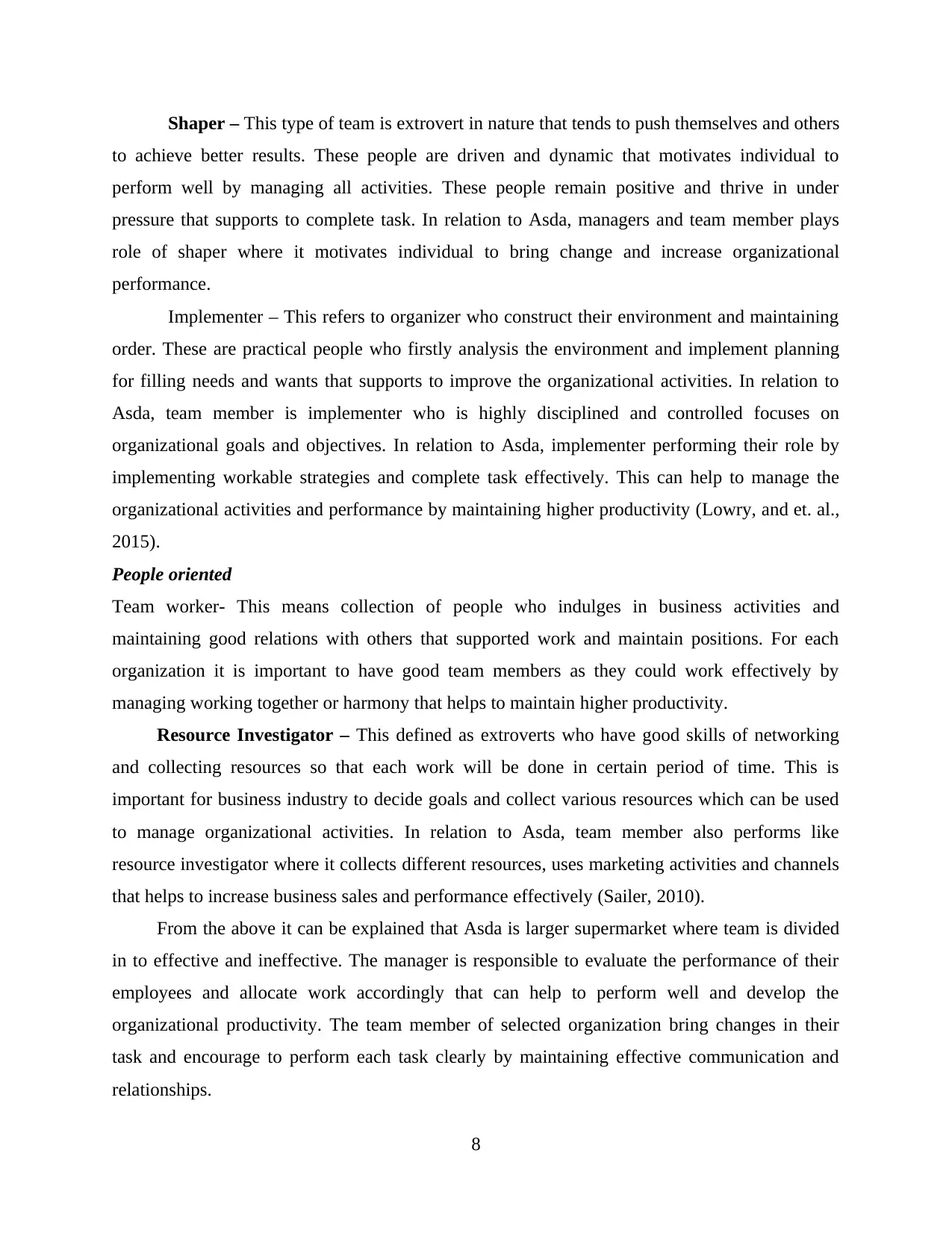
Shaper – This type of team is extrovert in nature that tends to push themselves and others
to achieve better results. These people are driven and dynamic that motivates individual to
perform well by managing all activities. These people remain positive and thrive in under
pressure that supports to complete task. In relation to Asda, managers and team member plays
role of shaper where it motivates individual to bring change and increase organizational
performance.
Implementer – This refers to organizer who construct their environment and maintaining
order. These are practical people who firstly analysis the environment and implement planning
for filling needs and wants that supports to improve the organizational activities. In relation to
Asda, team member is implementer who is highly disciplined and controlled focuses on
organizational goals and objectives. In relation to Asda, implementer performing their role by
implementing workable strategies and complete task effectively. This can help to manage the
organizational activities and performance by maintaining higher productivity (Lowry, and et. al.,
2015).
People oriented
Team worker- This means collection of people who indulges in business activities and
maintaining good relations with others that supported work and maintain positions. For each
organization it is important to have good team members as they could work effectively by
managing working together or harmony that helps to maintain higher productivity.
Resource Investigator – This defined as extroverts who have good skills of networking
and collecting resources so that each work will be done in certain period of time. This is
important for business industry to decide goals and collect various resources which can be used
to manage organizational activities. In relation to Asda, team member also performs like
resource investigator where it collects different resources, uses marketing activities and channels
that helps to increase business sales and performance effectively (Sailer, 2010).
From the above it can be explained that Asda is larger supermarket where team is divided
in to effective and ineffective. The manager is responsible to evaluate the performance of their
employees and allocate work accordingly that can help to perform well and develop the
organizational productivity. The team member of selected organization bring changes in their
task and encourage to perform each task clearly by maintaining effective communication and
relationships.
8
to achieve better results. These people are driven and dynamic that motivates individual to
perform well by managing all activities. These people remain positive and thrive in under
pressure that supports to complete task. In relation to Asda, managers and team member plays
role of shaper where it motivates individual to bring change and increase organizational
performance.
Implementer – This refers to organizer who construct their environment and maintaining
order. These are practical people who firstly analysis the environment and implement planning
for filling needs and wants that supports to improve the organizational activities. In relation to
Asda, team member is implementer who is highly disciplined and controlled focuses on
organizational goals and objectives. In relation to Asda, implementer performing their role by
implementing workable strategies and complete task effectively. This can help to manage the
organizational activities and performance by maintaining higher productivity (Lowry, and et. al.,
2015).
People oriented
Team worker- This means collection of people who indulges in business activities and
maintaining good relations with others that supported work and maintain positions. For each
organization it is important to have good team members as they could work effectively by
managing working together or harmony that helps to maintain higher productivity.
Resource Investigator – This defined as extroverts who have good skills of networking
and collecting resources so that each work will be done in certain period of time. This is
important for business industry to decide goals and collect various resources which can be used
to manage organizational activities. In relation to Asda, team member also performs like
resource investigator where it collects different resources, uses marketing activities and channels
that helps to increase business sales and performance effectively (Sailer, 2010).
From the above it can be explained that Asda is larger supermarket where team is divided
in to effective and ineffective. The manager is responsible to evaluate the performance of their
employees and allocate work accordingly that can help to perform well and develop the
organizational productivity. The team member of selected organization bring changes in their
task and encourage to perform each task clearly by maintaining effective communication and
relationships.
8
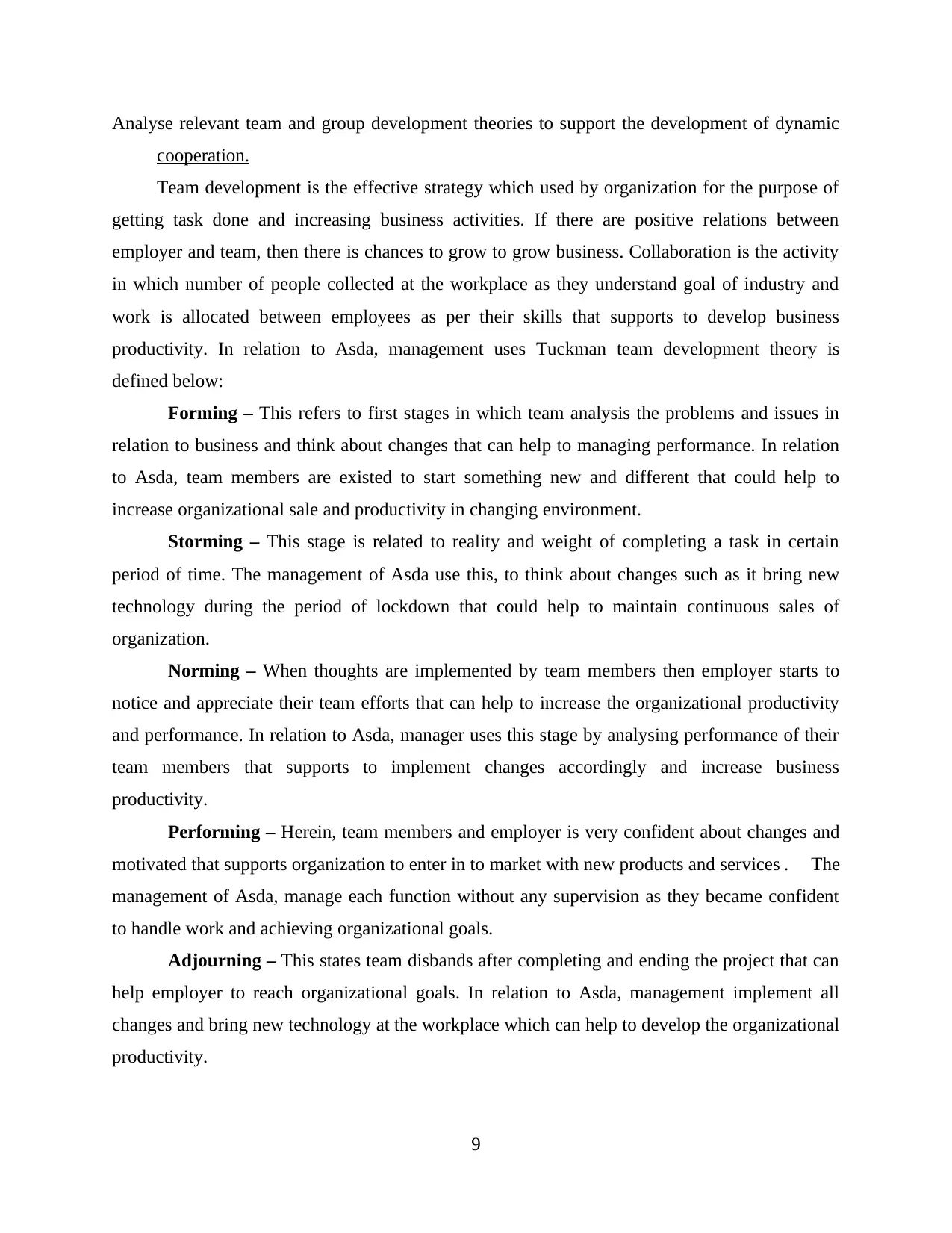
Analyse relevant team and group development theories to support the development of dynamic
cooperation.
Team development is the effective strategy which used by organization for the purpose of
getting task done and increasing business activities. If there are positive relations between
employer and team, then there is chances to grow to grow business. Collaboration is the activity
in which number of people collected at the workplace as they understand goal of industry and
work is allocated between employees as per their skills that supports to develop business
productivity. In relation to Asda, management uses Tuckman team development theory is
defined below:
Forming – This refers to first stages in which team analysis the problems and issues in
relation to business and think about changes that can help to managing performance. In relation
to Asda, team members are existed to start something new and different that could help to
increase organizational sale and productivity in changing environment.
Storming – This stage is related to reality and weight of completing a task in certain
period of time. The management of Asda use this, to think about changes such as it bring new
technology during the period of lockdown that could help to maintain continuous sales of
organization.
Norming – When thoughts are implemented by team members then employer starts to
notice and appreciate their team efforts that can help to increase the organizational productivity
and performance. In relation to Asda, manager uses this stage by analysing performance of their
team members that supports to implement changes accordingly and increase business
productivity.
Performing – Herein, team members and employer is very confident about changes and
motivated that supports organization to enter in to market with new products and services . The
management of Asda, manage each function without any supervision as they became confident
to handle work and achieving organizational goals.
Adjourning – This states team disbands after completing and ending the project that can
help employer to reach organizational goals. In relation to Asda, management implement all
changes and bring new technology at the workplace which can help to develop the organizational
productivity.
9
cooperation.
Team development is the effective strategy which used by organization for the purpose of
getting task done and increasing business activities. If there are positive relations between
employer and team, then there is chances to grow to grow business. Collaboration is the activity
in which number of people collected at the workplace as they understand goal of industry and
work is allocated between employees as per their skills that supports to develop business
productivity. In relation to Asda, management uses Tuckman team development theory is
defined below:
Forming – This refers to first stages in which team analysis the problems and issues in
relation to business and think about changes that can help to managing performance. In relation
to Asda, team members are existed to start something new and different that could help to
increase organizational sale and productivity in changing environment.
Storming – This stage is related to reality and weight of completing a task in certain
period of time. The management of Asda use this, to think about changes such as it bring new
technology during the period of lockdown that could help to maintain continuous sales of
organization.
Norming – When thoughts are implemented by team members then employer starts to
notice and appreciate their team efforts that can help to increase the organizational productivity
and performance. In relation to Asda, manager uses this stage by analysing performance of their
team members that supports to implement changes accordingly and increase business
productivity.
Performing – Herein, team members and employer is very confident about changes and
motivated that supports organization to enter in to market with new products and services . The
management of Asda, manage each function without any supervision as they became confident
to handle work and achieving organizational goals.
Adjourning – This states team disbands after completing and ending the project that can
help employer to reach organizational goals. In relation to Asda, management implement all
changes and bring new technology at the workplace which can help to develop the organizational
productivity.
9
⊘ This is a preview!⊘
Do you want full access?
Subscribe today to unlock all pages.

Trusted by 1+ million students worldwide
1 out of 16
Related Documents
Your All-in-One AI-Powered Toolkit for Academic Success.
+13062052269
info@desklib.com
Available 24*7 on WhatsApp / Email
![[object Object]](/_next/static/media/star-bottom.7253800d.svg)
Unlock your academic potential
Copyright © 2020–2026 A2Z Services. All Rights Reserved. Developed and managed by ZUCOL.




